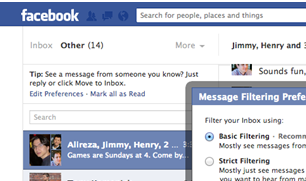Facebook Announces Another Change To Dislike: Letting Strangers Pay To Message You

Facebook has announced some changes to its messaging system.
“Facebook Messages is designed to get the most relevant messages into your Inbox and put less relevant messages into your Other folder,” writes the company in an announcement posted earlier today.
A few paragraphs later — boom goes the dynamite:
Today we’re starting a small experiment to test the usefulness of economic signals to determine relevance. This test will give a small number of people the option to pay to have a message routed to the Inbox rather than the Other folder of a recipient that they are not connected with.
Several commentators and researchers have noted that imposing a financial cost on the sender may be the most effective way to discourage unwanted messages and facilitate delivery of messages that are relevant and useful.
And several stockholders have told the company “make money in any way possible by leveraging the hundreds of millions of users.”
Rather than just admit this is intended for marketers to use for the purpose of pitching some product to users, Facebook gives the laughable examples of a plain old regular Joe/Jane who wants to “send a message to someone you heard speak at an event but are not friends with, or if you want to message someone about a job opportunity.”
For the purposes of the test, Facebook is limiting this to personal messages and capping it at one message per week. Again, these limits are simply during the testing phase, so it’s not known what, if any, restrictions will be placed on messages if this goes live to everyone.
It’s worth noting that Facebook doesn’t detail what a “personal” message is. There are any number of professional shills on Facebook whose accounts appear to be for individuals but who get paid to be “social media ambassadors” for flavored vodkas or other such crap.
The optimistic folks at TheVerge.com see some utility to the average Facebook user in this sort of paid messaging system — inviting friends of friends to surprise parties and such — but we don’t imagine that Facebook, whose stock value is still around 2/3 of what it was when it went public in the spring, is simply looking to earn a few extra bucks off its regular users.
Make no mistake, whatever Facebook claims in its press statements, changes like these are being done to lure in bigger dollars from marketers and advertisers.
Want more consumer news? Visit our parent organization, Consumer Reports, for the latest on scams, recalls, and other consumer issues.

